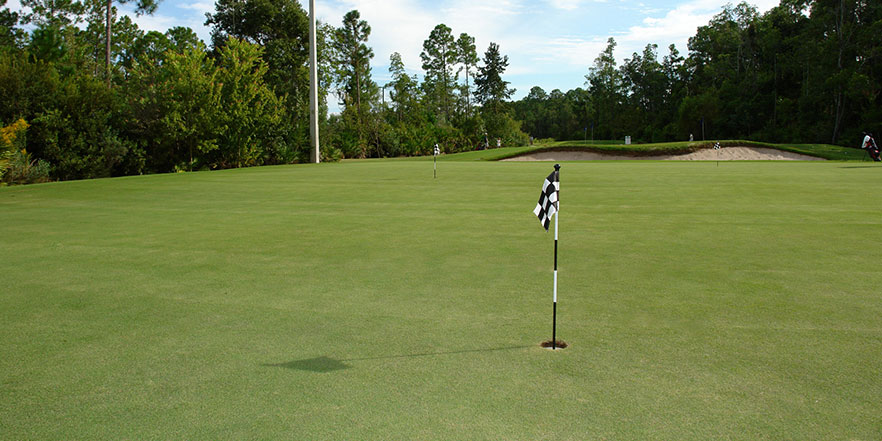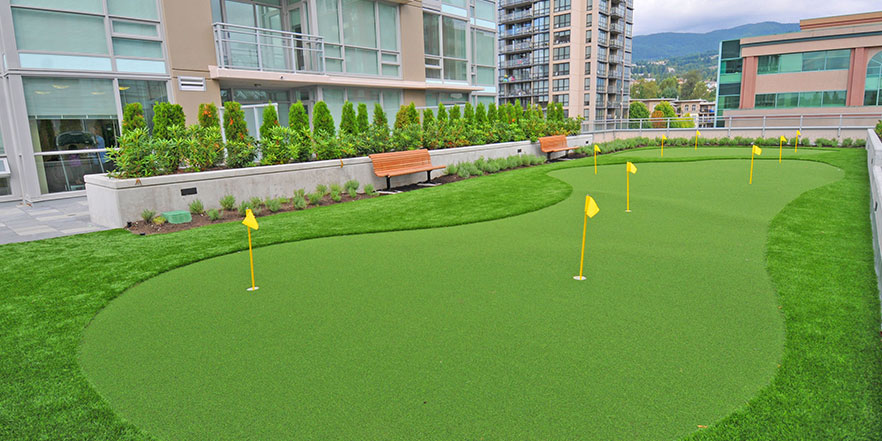
Artificial Turf for Golf Courses
Looking for high-quality artificial turf for your golf courses? Then, you are on the right page! Let’s get detailed information on our artificial turf installation services for golf courses.
What Is Artificial Turf?
Artificial turf, also known as synthetic turf or fake grass, is a type of surface made from synthetic fibers that are designed to look and feel like natural grass. Artificial turf is typically used in a variety of applications, such as sports fields, landscaping, and residential and commercial lawns.
The fibers used in artificial turf are typically made from materials such as polyethylene, nylon, or polypropylene, and are designed to be durable and resistant to wear and tear. The fibers are attached to a backing material, which is typically made from a layer of woven fabric or a rubberized material.
Artificial turf can be designed to look and feel like natural grass, with different colors and textures to mimic the look of real grass. Some types of artificial turf are even designed to have a slight variation in color and height, creating a more natural-looking surface.
There are several benefits to using artificial turf, including reduced maintenance and water usage, increased durability and longevity, and the ability to install it in areas where natural grass is not feasible or desirable. However, there are also some potential drawbacks to consider, such as the initial cost of installation and the potential for increased heat buildup on hot days.

Where to Use Artificial Turf?
Artificial turf, also known as synthetic grass, is a popular alternative to natural grass. It is used in a variety of applications, including:
- Sports fields: Artificial turf is commonly used on sports fields, such as football, soccer, and baseball fields, due to its durability and low maintenance requirements.
- Landscaping: Synthetic grass is often used for landscaping purposes, including residential lawns, commercial properties, and public parks. It can be used to create a lush, green lawn without the need for watering or mowing.
- Playgrounds: Artificial turf is a popular choice for playgrounds due to its soft, cushioned surface. It can also help prevent injuries from falls.
- Golf courses: Synthetic grass is used on golf courses for putting greens, driving ranges, and tee boxes.
- Rooftop gardens: An artificial turf is a great option for rooftop gardens, as it is lightweight and does not require soil. It can create a green space for relaxation and recreation in urban areas.
- Indoor spaces: Synthetic grass can also be used in indoor spaces, such as gyms, to create a natural look and feel without the need for natural light or water.
Overall, artificial turf is a versatile and durable option for a variety of applications, from sports fields to residential lawns.
How to Choose Artificial Turf for Golf Courses?
When choosing artificial turf for golf courses, there are several important factors to consider:
- Quality: Look for artificial turf that is of high quality and has been specifically designed for golf courses. The turf should be able to withstand heavy foot traffic and resist wear and tear from golf equipment.
- Pile height: Pile height refers to the length of the turf fibers. For golf courses, shorter pile heights are generally preferred.
- Density: The density of the turf refers to the amount of fiber per square meter. Higher-density turf will provide a more realistic look and feel.
- Infill: Infill is a material that is used to fill the space between the turf fibers. For golf courses, sand infill is often used to help provide stability and to simulate the feel of a natural golf course.
- Drainage: Make sure that the artificial turf you choose has proper drainage capabilities, as golf courses require a lot of watering and drainage.
- UV stability: Look for artificial turf that is UV stable and can withstand exposure to the sun without fading or deteriorating over time.
- Manufacturer's warranty: Check the warranty of artificial turf installation companies to ensure that you are getting a high-quality product that is backed by a reliable warranty.
Overall, choosing the right artificial turf for a quality golf course artificial turf installation requires careful consideration of factors such as quality, pile height, density, infill, drainage, UV stability, and warranty. It's important to work with a reputable supplier who can provide expert advice and guidance in selecting the best turf for your specific needs and turf installation cost.

What is the Cost of Artificial Turf?
The artificial turf cost varies depending on several factors, including the quality of the turf, the pile height, the density, and the size of the area to be covered. The cost may also be affected by factors such as the complexity of the installation, the type of infill used, and any additional features or customization. When considering the cost of artificial turf, it's important to work with a reputable supplier or installer who can provide detailed information on pricing, as well as advice on selecting the best turf for your specific needs and budget.
-
The Benefits of Basketball for Kids and Tartan Ground!
Sport is an activity that enables children to develop physically, socia...
Review News -
Which Phases Have Been Gone Thorough To Make Indoor Carpet Pitch?
Sports facilities and carpet pitches became widespread and people start...
Review News -
How to Produce Artificial Grass
While artificial grass production is one of the most valuable options, ...
Review News